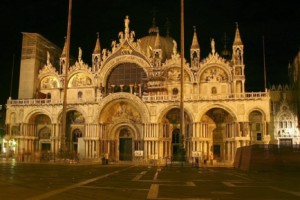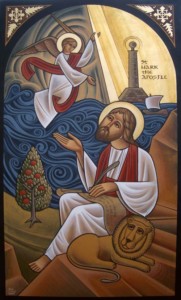Choosing my favorite gospel would be a foolhardy task. Each of the four canonical gospels has its profound insights, theogical importance, and literary charms. I do, however, tend to return to Saint Mark in lectio divina. Since he is traditionally identified as a disciple of Saint Peter, perhaps it’s the influence of my patron saint at work (in the First Letter of Peter, the author refers to “my son Mark” [1 Peter 5: 13]). Since today is his feast day, I’d like to share with you some of what makes this gospel special and interesting.
First of all, it is the shortest of the gospels, mostly because Jesus does very little teaching. The breathless story leaps from event to stunning event. Mark resorts often to the word “immediately,” when describing the action. This is probably an allusion to the immediacy of the creation narrative in Genesis 1. God speaks, and things spring into being. Jesus’s speech has the same power and efficacy.
We now know, almost for certain, that the earliest version of Mark’s gospel had no report of the resurrection. The earliest manuscripts lack chapter 16, or have a confused mixture of different resurrection stories which appear to be later insertions. Some critics leverage this fact to claim that there was no resurrection. This begs the question of why Mark would trouble to write a book if nothing special happened after the death of Jesus. Nevertheless, this curious fact demands an explanation. From a purely literary standpoint, Mark’s gospel has no need of an account of the resurrection for several reasons. First of all, he’s writing for insiders who either believe already, or are surrounded by persons who know and retell often the stories of the risen Jesus. There is good reason to think that the Church herself is the presence of the risen Christ in Mark’s worldview (an idea unpacked by my NT professor Deacon Charles Bobertz). Most importantly, in the opening of the gospel, Mark unambiguously announces that Jesus is the Son of God [1: 1]. John the Baptist then prophesies “Prepare the way of the Lord [=God],” just before Jesus arrives. This is followed by Jesus’s baptism, which is a clear anticipation of the resurrection, ascension, and descent of the Holy Spirit: “When he came up [anabainon=”arose”] out of the water, immediately he saw the heavens open (Ascension) and the Spirit descending upon him (the Spirit descending on the Church, which is Christ’s risen body) [Mark 1: 10].”
In fact, the lack of a resurrection narrative strikes me as the foremost instance of one of Mark’s literary innovations, the use of irony as a challenge to the reader or listener. Will I decide for or against Christ? Mark leaves the story unfinished so that we must ask ourselves, “What do I think happened next? Do I believe that the man depicted here is the Son of God Who died for us and rose again?”
This challenge appears in another often-misunderstood episode in Mark’s gospel:
And as he was setting out on his journey, a man ran up and knelt before him, and asked him, ‘Good Teacher, what must I do to inherit eternal life?’ And Jesus said to him, ‘Why do you call me good? No one is good but God alone. [Mark 10: 17-18]
Hasty readers often paraphrase Jesus’s words to mean, “Why are you calling me good? I’m not God after all.” But what if the Lord’s question is not rhetorical? Jesus, like a good rabbi, has proposed a syllogism to the man. The major premise is that only God is good; the minor premise is the fact that the man called Jesus good. Will the man draw out the implication of his own words and recognize Jesus as God? Or is the man is only calling Jesus good to flatter him? Either way, the question goes unanswered. The man’s dejected response to Jesus’s later invitation to follow Him demonstrates a blinding attachment to the world. As a result, he lacked the insight to grasp the question that Jesus posed. It’s as if he didn’t even hear it. Will I avoid that mistake?
Mark’s use of irony helps to answer yet another famous conundrum. At the end of Mark’s gospel, the only words that Jesus utters from the Cross are slightly scandalous: “My God, my God, why have you forsaken me? [15: 34]” This verse is again used as supposed evidence that Jesus did not anticipate his resurrection, and that he had been mistaken in trusting God. In short, it is the clincher that Jesus is not the Son of God, and that the divine “Jesus of faith” is a later fabrication of the Church. How ironic, then, that the centurion standing at the foot of the Cross does identify him! “And when the centurion, who stood facing him, saw that he thus breathed his last, he said, ‘Truly this man was a son of God!’ [15: 39–my translation]” Once again, Mark depicts the scene with heavy irony; an anonymous pagan soldier has more insight into the identity of Jesus than anyone else. Whose vision do I share?
To understand the real import of Jesus’s words from the Cross, we should look to their source, Psalm 22 [21 in the Vulgate]. This poignant, beautiful poem chanted every Sunday in the monastery is a classic example of a lament. The Psalmist describes merciless attacks by enemies, disease, and wild animals as an anticipation of death and abandonment by God. Mark alludes to two prophecies from this Psalm: “they have pierced my hands and my feet [v. 16],” and “they divide my clothing among them [v. 18–cf. Mark 15: 24].”
Next we should note the amazing reversal that takes place in this Psalm. After twenty plus verses of agony, a light begins to appear:
You who fear the Lord, praise him!…For he has not despised or abhorred the affliction of the afflicted; and he has not hid his face from him, but has heard, when he cried to him….All the ends of the earth shall remember and turn to the Lord; and all the famlies of the nations shall worship before him. [vv. 23a, 24, 27]
I could easily have quoted more, but the point is that the reversal that takes place in Psalm 22 is foreshadowing of the resurrection from the dead (the great Jewish Biblical scholar Jon D. Levenson corroborates this reading, especially in his book Resurrection and the Restoration of Israel). Moreover, the result of this resurrection is that not only Israel worships the One True God; all nations are gathered to God. Saint Mark, probably writing around the year 70 A.D. in Rome, can point to his own mixed congregation as proof that the prophecy of this Psalm has been fulfilled by Jesus, who quoted its opening lines in the inaugurating moment of salvation.
The evangelist John, writing much later (and it’s hard say whether he knows Mark’s gospel), perfects these techniques of irony, but it is Mark who first seized on this procedure to press his readers toward the crucial moment of decision. The urgency of this gospel speaks to us at every moment. Am I one who witnesses to Christ’s identity by my own life? Am I like the rich young man who wants reassurance from Christ but refuses the act of faith that would alter my world? Is my faith in need of strengthening, such as the blind man whose initial cure allowed him only partial vision [Mark 8: 22-26]? Once you’ve finished reading Paul’s Letter to the Philippians, maybe Mark’s gospel will provide the comfort and challenge fit for the moment.

